Confirmation Bias and Celebrity Weight.

 Sorting out who you are sometimes requires questioning about how other people live. Looking to celebrities is, for good or bad, one of the ways that many of us compare ourselves with the world. The part of this process that can be bad is when we don’t look for the whole picture or we aren’t aware of the parts of the picture that we can’t see.
Sorting out who you are sometimes requires questioning about how other people live. Looking to celebrities is, for good or bad, one of the ways that many of us compare ourselves with the world. The part of this process that can be bad is when we don’t look for the whole picture or we aren’t aware of the parts of the picture that we can’t see.
Confirmation Bias, which means we see one piece of evidence and think that means it’s always true, lets some of us believe that if some people can loose or gain weight then all of us can. And I think celebrities are a natural fodder for this kind of confirmation bias.
But let’s take a step back here and be critical thinkers for a second. The next time you see one of those “Celebrity Y lost X LBS in Z days” here are some helpful things to remember.
1. Thin is part of their job.
Young and thin is the standard of celebrity culture. So celebrities aren’t really a reflective sampling of the population. I would go so far as to say most celebrities are probably naturally thin to start off with.
As for staying thin, celebrities have time and money dedicated to that pursuit. They can afford things like nutritionists, meal delivery services, special exercise equipment, exercise classes, and trainers. If they need to spend two or more hours a day in the gym to get in shape, they have the time to do that.
2. Be critical of stories without minutia.
I was surprised when I went to look at articles about celebrity weight gain and weight loss how rarely the details are mentioned. Things like “how many calories a day” and “how much exercise a day or week” and “how log did it take them to gain or loose” are often completely skipped.
The whole “I exercised and ate right” could mean just about anything. And “I cut out soda/candy” or “I’m eating more carrots/celery” tells us very little about a person’s weight loss experience.
3. Celebrities are people, too.
Some celebrities “struggle” with their weight, and others don’t. I found a quote of Kirstin Dunst saying, “I do eat healthily but I’m not a freak about it…I eat what I want to eat.” And another quote where she said, “I honestly don’t work out.”
But then there’s Riki Lake who says she keeps her weight down by eating a special diet of 1,200 calorie a day and hiking/running 9 miles, four times a week.
4. What you experience is real.
Sometimes what we find when we compare ourselves to the world is that our experiences are different. That doesn’t mean we’re lying or wrong, it just means we’re individuals.








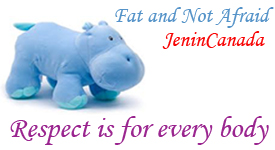

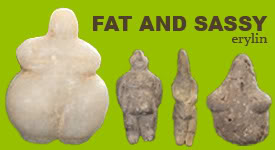
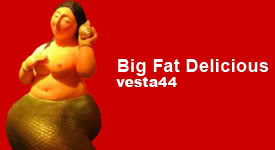

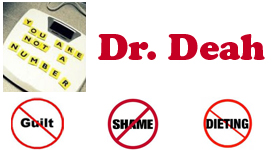


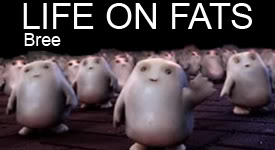
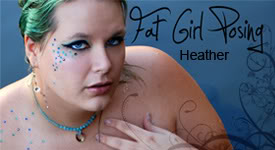


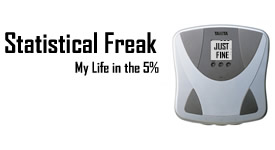
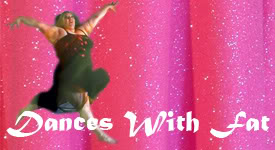

It would be easier if we could just slap a sticker on the entire human population that says “Your results may vary”.
Then every time we start up with the comparison game of “why am I not thin / rich / smart / funny / cool / etc like that person?” we can remember… oh yeah… everyone is different!
I know I could do with the reminder myself!
Yeah, Mr. Spock knew that in the 60′s. He wore a pin celebrating Infinite Diversity in Infinite Combinations! (probably should attribute that to Gene Roddenberry though, no offense to Vulcans)
noceleryplease -
There’s this awesome website called Body Positive and they present the talking point “Maybe we are like breeds of dogs” as a way to explain setpoint theory.
Personally I’m not down with being compared to a dog but it is a way to talk about the idea that there’s genetic variation within the human population. In my own words, “we’re genetically similar but also genetically unique.”
I find that even for myself, I am conflicted. I spent two years as the poster child for great weight loss. I was even in an internet commercial as a “success” story. The problem is that without the RX Phen drug I was taking (Meridia), the loss was unsustainable. I nearly lost my life! Not exaggerating. And yes, I did tell them about the drug in the commercial. They didn’t care. They just wanted before and after shots.
When I see people like Star Jones (who has totally lost her looks since crash dieting via surgery) or Kristie Ally (who hates her body but makes money off of it) I feel that at least I am part of the human race. Famous or not, we are all conflicted about our bodies and really, unless we let others know how we feel, we can show one face to the world and hide all of our pain inside.
And it’s not just people who are overweight who hate their bodies.
I am learning to embrace my very healthy body even with a weight number that I don’t want to think about. I am now shopping for my own body’s size, the scale is gone and I am doing only the exercise that I want to do.
Mom -
Good for you! Giving up the scale can be very liberating.
And I am a big proponent of the idea that “it’s not just people who are overweight who hate their bodies.” I’m very aware that body image issues are not limited to a weight range or a gender.
I may write about fat acceptance, in particular, but part of my argument is about supporting a body positive perspective for all.
I third the idea that body image issues aren’t actually that related to a person’s actual shape or size! My self-image has gotten dramatically better in the last few years, even as my weight has gone up. For me, gaining enough weight that I was unequivocally “unacceptable” by the narrow standards I’d set for myself was actually very positive, because it forced me to realize that those standards just were total BS in the first place!!
You’ve kind of skirted one part of the issue, as well.
Many female celebrities engage in dangerous, life-threatening practices in order to achieve these “perfect” bodies, whether it’s through an eating disorder, excessive exercise, legal or illegal drugs, or just plain starving themselves.
It would be nice if, for once, People magazine had a headline that read, “Hayden Pantierre gets a stellar checkup from her doctor; health ideal!”
Peace,
Shannon
atchka -
As always, you excellent at spotting the lack of minutia! I thought about going into “dieting is an eating disorder” argument but it seemed like that would be better suited for it’s own individual post.
I even found this awesome article in my research (although it is a news article and not a research article) that goes into breaking down how much certain celebrities are eating based on what they have told the media in the past. Celeb calorie counter: how much are they eating?
Almost all of the thin celebrities in that article are estimated to eat LESS THAN 1,000 calories a day. (BTW…if you’d like to write a post about this, I’d be willing to find you a couple more links to support the discussion.)
I read that article and it’s scary. This is why these starlets have to get breast implants, they diet to the point where they simply can’t maintain any fatty tissue at all, so they put in plastic. 440 calories a day? That’s insane.
Meanwhile, our girls and boys are looking at these people who are plastered and airbrushed all over the media and they think that they can be super skinny, have great breasts and lots of money.
You know who I just love? Queen Latifah. What attitude. I know she’s playing roles, but her attitude is, “I love me and if you can deal with that, kiss my big butt!”
I want some of that attitude.
Hey, now! Some of us don’t get big boobies, no matter how much we eat! XD
I think you are totally right, though, that the “ideal” of skinny body/no hips/big breasts is usually only achievable through plastic surgery.
Pretty ridiculous, huh?
Scary! But of course, people in general are notoriously bad at self-reporting how much they eat.
Elizebeth, you find the best links. I’m going to check that out. Maybe a post in the works? Great find! And the study below as well.
Peace,
Shannon
Simone -
This is true. Although, if you believe some of the research, supposedly overweight and obese people underestimate MORE than their normal weight counterparts. Luckily, there are some researchers out there that are not so willing to jump on the “fat people lie” bandwagon.
Participant characteristics associated with errors in self-reported energy intake…: “We found no association between BMI and energy underreporting such as was found in numerous other studies. An interesting point regarding the association of adiposity with underreporting is that there is no plausible biologic reason that excess body fat would, in and of itself, cause women to underreport energy intake.”
Except that lying about food/weight issues is so common. Someone in that article doesn’t understand that body issues are deeply rooted mental/emotional issues.
JanB -
I tend to object to the generalization that, as a rule, fat people lie about how much they eat. Or that fat people are mentally unstable.
Maybe I’ve mistaken your point and that’s not what you were trying to say? (I will readily concede the point that eating disorders do not restrict themselves to a particular weight range.)
Given that even the nutrition labels stating the calorie counts are often incorrect, I just don’t think it’s possible to accurately self-report eating for anyone.
noceleryplease -
I agree. The constant in the research is that self-reporting is flawed.
Nope, my point is that very few people tell the truth about what they eat, regardless of their weight.
Especially for those who are counting calories. So if someone says, as in that article, I only ate an apple, a bowl of oatmeal, a banana and ten grapes, totaling 443 calories — it sounds like some kind of red badge of courage that they are aiming for.
These people (and most of them are probably the very thin) who are ultra calorie conscious, they are headed for a crash, probably a serious binge and I doubt that they would factor that one into their daily calorie intake.
Isn’t it sad that we have become so obsessed with all of this?
And I guess my real point is, like in the Billy Joel song, there is very little honesty anymore.
Great, now I’m going to have to burst out into song throughout the day.
HOOOOOOOOOOOOOOOOOOOOOOOOONESTYYYYYYYYYYYY is such a lonely word. Everyone is so untruuuuuuuuuuue.
Peace,
Shannon
I’d lean more toward “all people self-report inaccurately.” I’m sure there are some fatties who lie and I’m just as certain there are some skinnies that lie. But I’d say that, on the whole, any inaccuracies are due to a fundamental flaw in human psychology. We tend to try and make ourselves look more like “normal,” however we perceive that to be.
So, if you consume excess calories, you probably under-report and if you don’t consume enough calories, you probably over-report. That’s my theory anyway.
Peace,
Shannon